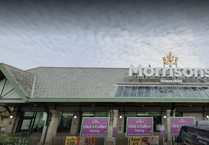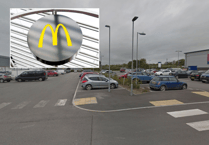Every year from April 30 to May 6 the British Hedgehog Preservation Society hosts Hedgehog Awareness Week to draw attention to the challenges that hedgehogs encounter and to provide information on how we can assist them.
One local wildlife rescuer who is ‘thinking hedgehog’ this year is Sue Gear of Bude.
Sue has been running a small wildlife rescue in her home in Bude for the last 22 years and has gained a vast amount of experience in all things hedgehogs.
“It all started 28 years ago when we lived in Isleworth Middlesex. I ran a lost and found register for lost pets but would often get found pets brought to me. One day someone turned up with a sick hedgehog that they had “found” and that really was the beginning of my life with sick, injured and orphaned wildlife. I enrolled on a course at St Tiggywinkles to learn as much as I could about helping hedgehogs and was blown away by all the other species that needed our help. I have since been on lots of wildlife courses at Secret World in Somerset who I also get a great deal of support from.
“I have now worked at Tamar Vets in Bude for 22 years and am lucky enough to receive their support and expertise for which I am very grateful and would not be able to do without.”
Working out of her home, it’s an ordinary day for Sue if a poorly buzzard or rabbit is seen recovering in the front room.
“At home my husband Barry is my rock and puts up with all the strange animals that come through our doors on a daily basis, and with help from our sons Jack and Billy have built many aviaries to rehabilitate birds from robins to buzzards.
“Many of the animals that arrive are orphans which need hand rearing and rehabilitating before they can be released. Many others arrive sick or injured through no fault of their own, in fact it is us humans that cause most of the problems. I feel we should give something back and lend the animals a helping hand.
“Medication, heat, food, bedding, incubators, heat lamps, cages and aviaries are a few of the things needed to keep Born to be Wild going. These items often need replacing. I am not a registered charity and get no funding so I rely completely on donations. All profits from the sale of this calendar will go to help Bude wildlife.”
Sue wants to emphasise the importance of being hedgehog aware and making sure gardens are hog friendly as soon many will be giving birth to their first spiky litters throughout the month of May
There are many things that people can do to support this. The British Hedgehog Preservation Society has provided some handy hints and tip to keep our precious friends safe.
First, there are lots of hazards that can be removed or improved such as:
- Poisons and pesticides that could directly harm hedgehogs and destroy their food chain.
- Uncovered drains - hedgehogs can fall into these and become stuck so make sure yours are covered up.
- Litter is a problem for all wildlife and while this is (hopefully) not an issue in your own garden, it very likely is in the wider environment. Contacting local landowners where litter is an issue can help; remember to point out the danger to wildlife.
- Netting can become entangled in hedgehog spines: make sure sports nets are put away and garden netting is at a height that hedgehogs can safely pass under.
- Always carefully check for hedgehogs before mowing, strimming or lighting a bonfire pile that they might have made a nest in.
There are also lots of lovely hedgehog-friendly features that can be added to make the area more welcoming to hedgehogs:
- Hedgehog highways are really important to allow access to more habitat; they are just 13cm x 13cm square gaps in the bottom of boundary walls and fences to ensure hedgehogs can get in and out easily; once these are made you can log your Hedgehog Highway at www.bighedgehogmap.org
- Feeding stations - offer water and meaty cat or dog food for hedgehogs in a feeding station to help keep the food safe for hedgehogs (see plans for a feeding station on the BHPS website or contact BHPS for a paper copy).
- Log piles, leaf piles or wild corners and edges will attract natural food and offer shelter for hedgehogs.
- Ponds or pools are great for wildlife but do ensure there are escape routes – a sloping edge, ramp or half-submerged rock for hedgehogs to scramble out on.
- Hedgehog homes – make or buy a hedgehog home (plans for building homes can be found on the BHPS website or contact BHPS for a paper copy).
By taking small steps, people can help to create and link excellent habitats for hedgehogs. Even those without garden space can still play a role by communicating with public space managers, as well as neighbours, family, and friends, to encourage them to contribute to the cause.

.png?width=209&height=140&crop=209:145,smart&quality=75)



Comments
This article has no comments yet. Be the first to leave a comment.